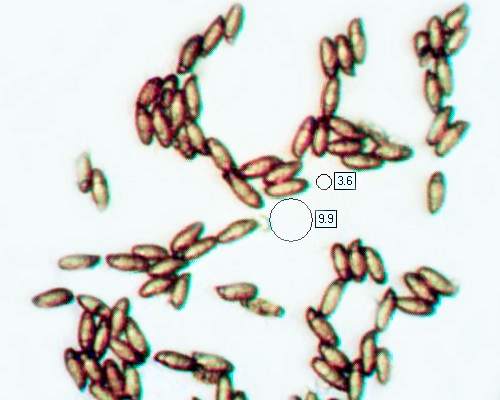Chalciporus piperatus (Bull.) Bataille - Peppery Bolete
Phylum: Basidiomycota - Class: Agaricomycetes - Order: Boletales - Family: Boletaceae
Distribution - Taxonomic History - Etymology - Identification - Culinary Notes - Reference Sources
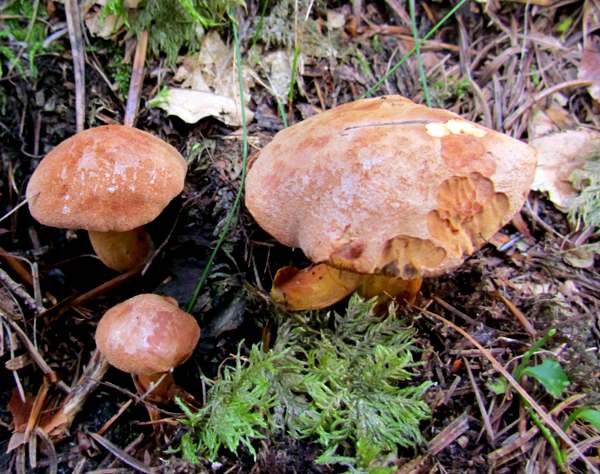
With its beautiful orange pores, this is one of the few boletes that can usually be identified with reasonable certainty in the field - er, in the woods, that is - although to be quite certain the spores should also be checked, because the rare bolete Rubinoboletus rubinus is macroscopically similar.
Distribution
Fairly common in deciduous woodland and pine forests, often with birches, in Britain and Ireland as well as many mainland European countries, this attractive bolete (or at least one currently given the same name) is recorded also in North America, where it is found most often in conifer plantations.
The specimens pictured at the top of this page were seen in mixed pine, oak and birch woodland in central France, while the Peppery Bolete shown below was seen near Monchique, southern Portugal.
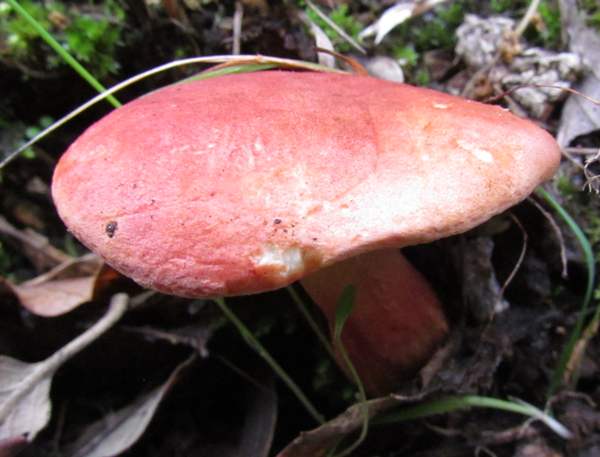
Chalciporus piperatus is the type species of the genus Chalciporus, within which about 25 species are known worldwide. In Britain the Peppery Bolete is the only member of this genus currently recorded.
Etymology
The generic name Boletus comes from the Greek bolos, meaning 'lump of clay', while the specific epithet piperatus comes from Latin and means exactly what it sounds like: peppery.
Identification guide
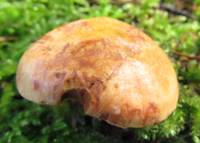 |
Cap2 to 8cm across, initially hemispherical and eventually becoming almost flat and often with a slightly wavy margin; dry, dull and slightly sticky when young, becoming smooth and shiny when mature; slightly greasy in wet weather; yellowish orange to cinnamon brown. The flesh of young specimens is firm, but mature Peppery Boletes usually have very spongy cap flesh. |
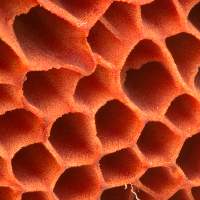 |
Tubes and PoresThe cinnamon tubes terminate in large rusty-orange angular pores that do not change colour significantly when bruised. |
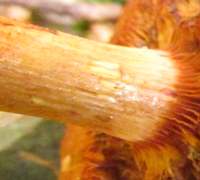 |
Stem3 to 7cm tall and 0.5 to 1.8cm in diameter; surface often has shallow longitudinal grooves; upper region flushed with colour as cap; cylindrical, usually tapering in slightly towards a yellowish base. |
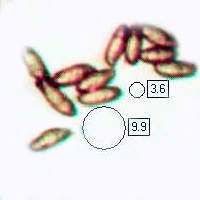 |
SporesSubfusiform, smooth, 8-11 x 4-5.5µm.
Spore printCinnamon. |
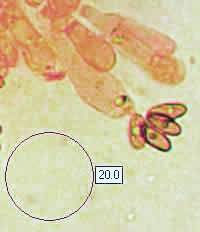 |
Other microscopic charactersThe basidia (left) are four-spored. |
Odour/taste |
Odour not distinctive, taste hot and very peppery. |
Habitat & Ecological role |
Mycorrhizal, found in mixed woodland, often with pines and birches. |
Season |
Summer and autumn in Britain and Ireland; through into the New Year in the Iberian Peninsula and other parts of the Mediterranean region. |
Similar species |
Rubinoboletus rubinus is mycorrhizal with oaks; it has broadly ellipsoidal spores. Suillellus luridus is much larger and has a reticulate stem; its pores become orange at maturity but they quickly turn blue when bruised. Rubroboletus satanas has a white cap and orange or red pores when mature; its flesh turns pale blue when cut and then fades back to its original pallid colour. |
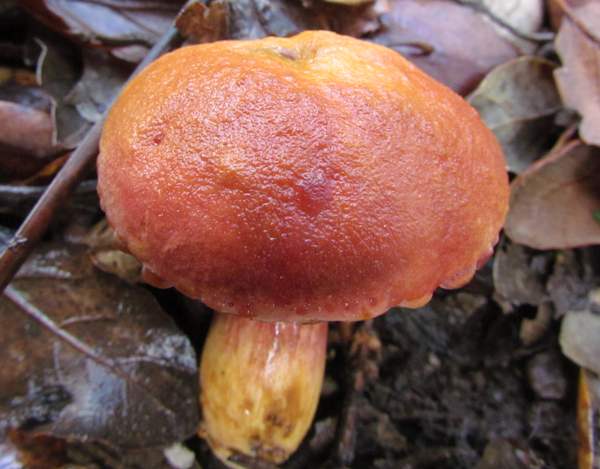
Culinary Notes
Chalciporus piperatus, the Peppery Bolete, is reported to be edible when thoroughly cooked, but it is very peppery and probably best used to spice up other mushroom dishes. (This mushroom could possibly be confused with poisonous species such as Rubroboletus satanas.)
Reference Sources
Fascinated by Fungi, 2nd Edition, Pat O'Reilly 2016, reprinted by Coch-y-bonddu Books in 2022.
British Boletes, with keys to species, Geoffrey Kibby (self published) 3rd Edition 2012
Roy Watling & Hills, A.E. 2005. Boletes and their allies (revised and enlarged edition), - in: Henderson, D.M., Orton, P.D. & Watling, R. [eds]. British Fungus Flora. Agarics and boleti. Vol. 1. Royal Botanic Garden, Edinburgh.
Dictionary of the Fungi; Paul M. Kirk, Paul F. Cannon, David W. Minter and J. A. Stalpers; CABI, 2008
Taxonomic history and synonym information on these pages is drawn from many sources but in particular from the British Mycological Society's GB Checklist of Fungi.
Fascinated by Fungi. Back by popular demand, Pat O'Reilly's best-selling 450-page hardback book is available now. The latest second edition was republished with a sparkling new cover design in September 2022 by Coch-y-Bonddu Books. Full details and copies are available from the publisher's online bookshop...

